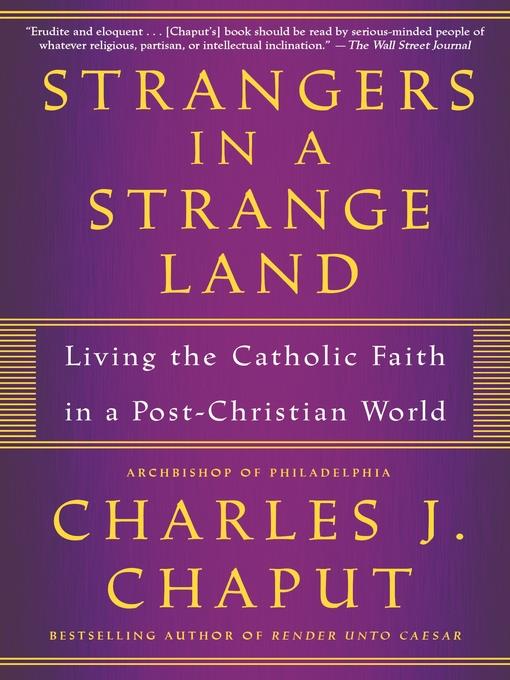
Strangers in a Strange Land
Living the Catholic Faith in a Post-Christian World
فرمت کتاب
ebook
تاریخ انتشار
2017
نویسنده
Charles J. Chaputناشر
Henry Holt and Co.شابک
9781627796750
کتاب های مرتبط
- اطلاعات
- نقد و بررسی
- دیدگاه کاربران
نقد و بررسی

January 9, 2017
Chaput (A Heart on Fire), Catholic archbishop of Philadelphia, has crafted a thorough response to the 2015 Supreme Court decision, Obergefell v. Hodges, which effectively legalized same-sex marriage. Much as he used directives on insurance and birth control in to argue that Christianity is under attack in the United States, Chaput utilizes Obergefell to mark a continued deterioration of Christian values. His argument is concisely delineated, but Chaput’s sincere beliefs can come across as overblown; he includes Obergefell and the HHS mandate in the same list of tragedies as 9/11, the Iraq wars, the 2008 economic meltdown, Syria’s civil war, and the predations of Boko Haram. Meanwhile, the Catholic Church’s sex abuse scandal receives a scant and oblique mention. Chaput also thoughtfully argues about technology’s part in the cultural shift away from community and toward the self, which dovetails neatly with his views on democracy. But his righteous indignation on LGBTQ rights, birth control, and abortion, like his contention that religion is inherent to morality, is arguably contributing to the very “post-Christian” nation he fears. Readers of faith will find much to contemplate in Chaput’s well-argued examples of the state of Christian influence on American culture.

December 15, 2016
What are American Catholics to do in today's troubled world? Chaput (Render Unto Caesar: Serving the Nation by Living Our Catholic Beliefs in Political Life, 2008, etc.), the archbishop of Philadelphia, urges Christians, and Catholics in particular, to be hopeful in the midst of a changing culture. Honing in on Western and especially American society, the author posits that irreparable changes have occurred in recent decades that change how the church must view its role; though times are more difficult for the Christian faith and for the institution of the church, believers can still live with hope. Chaput begins with a healthy dose of doom and gloom, describing social ills and a general drift away from faith or even from shared value systems. He writes at length about the sea change in sexual ethics, from the advent of the birth control pill to issues surrounding gender fluidity. These changes, he asserts, have challenged society at its very core. "Ultimately," he writes, sexual freedom "leads to questions about who a person is and what it means to be human." Likewise, excessive relativism in our education system means that "moral truths accessible to human reason, such as those in the Ten Commandments, don't really qualify as true." However, "for Christians, of course, truth is a Person," Jesus Christ, and this is what separates believers from the secular world surrounding them. Chaput goes on to encourage readers to embrace hope as a worldview and as a lifestyle. He points to the Beatitudes as a set of rules Christians can and should follow in a world that is ambivalent or even hostile to their beliefs. Finally, he encourages believers to pass on their faith in confidence and with purpose. Chaput is an erudite writer, and his work includes a wide array of quotations and allusions. His observations on Western culture are keen, and while secular-minded readers will find plenty to argue with, his writing will appeal to a wide Christian audience. An optimistic account of the church's future in the midst of a secular age.
COPYRIGHT(2016) Kirkus Reviews, ALL RIGHTS RESERVED.

January 1, 2017
The title of this book, from Exodus 2:22, is a commentary on how Archbishop of Philadelphia Chaput (Render Unto Caesar) maintains Catholics feel in present-day America: like "resident aliens." The archbishop, recognized in church circles as conservative, maintains that a "sea change" in our country's public life has resulted in Americans living in a world of cynicism and despair far from the founding fathers' intent. His intended audience is people--not only Catholics--who believe something is wrong with America but who do not know what to do about it. This book begins with a summary of the nation's original ideals and virtues and continues to outline how we got to where we are now, specifically in the areas of sexuality, religion, technology, demographics, and the economy. Final chapters detail how to live as Christians in a society that no longer shares Christian beliefs but instead focuses on the "cults" of individualism, institutionalism, and clericalism. VERDICT Well documented, with citations to a wide variety of sources in such areas as literature, philosophy, theology and politics, this book will most appeal to traditionally oriented Catholics.--Denise J. Stankovics, Vernon, CT
Copyright 2017 Library Journal, LLC Used with permission.

























دیدگاه کاربران